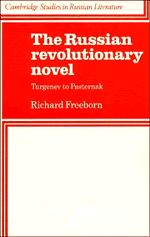3 - The revolutionary novel
Published online by Cambridge University Press: 04 April 2011
Summary
Introduction
In its depiction of the revolution of 1917 and the ensuing civil war the Russian revolutionary novel of the Soviet period celebrates events that had epoch-making significance for the Russian people. Whatever the political colouring given to these events by historical interpretations then and since, the revolution of 1917 and the civil war were concerned with confrontation between Whites and Reds, between capitalism and socialism, between the pre-revolutionary possessor class and the industrial proletariat in alliance with the poorer peasantry. In the end, the industrial proletariat and the poorer peasantry were the victors. The significance of this victory still reverberates in innumerable ways in all parts of the world.
The Russian revolutionary novel, in its depiction of revolutionary events, offers not so much a record as a multi-faceted re-animation of the human dimensions of events that may all too easily seem to lose their vital meaning in the pages of history books or even in the flickering, unstable images of the silent cinema. The smell and colour of those years of revolution and civil war, the human dimensions of the horror, outrage, terror and blood-letting, the sheer complexity of the experiences involved, the paradoxes of choice and allegiance that changing political and military situations forced upon so many and the problems of daily survival in the face of unbelievable shortages, plagues and catastrophes – these are what the literature of the period reflects. But a literature is by its very nature a survivor of events.
- Type
- Chapter
- Information
- The Russian Revolutionary NovelTurgenev to Pasternak, pp. 65 - 171Publisher: Cambridge University PressPrint publication year: 1983



